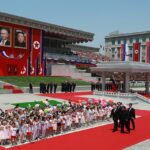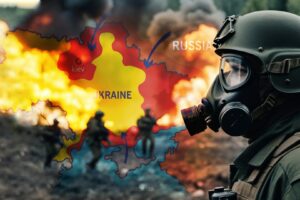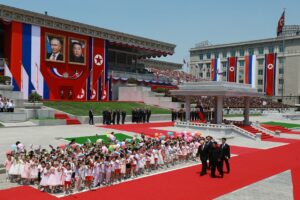Russian Pop year, Egor Gazarov packed his bags. A fluent English speaker who received an MBA from Insead in Paris and spent the first decade of his career climbing the ranks of Boston Consulting Group and Procter & Gamble, Gazarov left for Armenia to wait out the situation and seek out career opportunities in either the west or Middle East. Less than six months had passed, however, before he decided to return to Russia, disheartened by the jobs available to someone with his experience. “I came to understand that actually the job opportunities outside the country are not as good as they could be,” he said in a telephone interview from Moscow.
While hundreds of thousands of Russians left the country last year, some, such as Gazarov, have chosen to return to Moscow — a sign of the degree to which the Kremlin has managed to maintain a vestige of normality in the capital and contain some of the biggest economic shockwaves from the war.
More than 820,000 people have left Russia since February 2022, according to a study by Re:Russia, a website run by exiled academics. That exodus represents one of the biggest waves of emigration from Russia since at least the early 1990s, after the fall of the Soviet Union. The émigrés include dissidents opposed to the war and upwardly mobile young professionals, such as Gazarov, who left for economic reasons or to escape the draft. Some departed in the initial days and weeks of the full-scale invasion, while others left six months later, when the Kremlin ordered a mass mobilisation of men to fight in Ukraine.
While many dissidents have stayed in the countries to which they fled, some young professionals are choosing to return to Russia, either temporarily or indefinitely, after Vladimir Putin said the Kremlin had no plans for another mass mobilisation. The academics at Re:Russia said it was “highly likely” that some of those who had left Russia to avoid mobilisation had already returned. Recent turmoil in Israel and Armenia has further complicated matters for the thousands of Russians who had moved to those countries.
Egor Gazarov: ‘I came to understand that actually the job opportunities outside the country are not as good as they could be’ Nikita Kiktenko: ‘Life goes on, business continues to develop’ More than 35,000 Russians left for Israel last year, according to the Jewish Agency for Israel, the largest Jewish non-profit. Many are staying, and for those planning to return, lawmakers in Moscow have vowed a frosty reception in Siberian prisons. Armenia, a small republic in the Caucasus traditionally aligned with Moscow, has received more Russians than any other country besides Kazakhstan and Serbia. But after Azerbaijan took back the Armenian enclave of Nagorno-Karabakh last month despite Russian peacekeepers stationed there, anti-Russian sentiment has grown.
Emil Kamalov and Ivetta Sergeeva, two researchers at the European University Institute in Florence, have been studying the outflow of Russian émigrés in surveys since the start of the invasion. Respondents, they noted, were largely highly educated, politically engaged and young, compared with the overall Russian population. Yet more than 15 per cent of those surveyed had returned to Russia — some to settle their affairs, others more permanently. “It’s definitely not an economic migration in the classical sense,” Sergeeva said. “These are people who have been very competent specialists in Russia and are now losing the money, the status . . . For many people, the quality of life is declining [abroad].” The Kremlin has seized upon the trend. In June, Putin claimed that half of the Russians who had left since the war broke out had already come back. “I don’t see anything wrong here,” he said.
Other officials have asserted that many chose to return because of hostility and suspicion towards Russian immigrants, citing Czech president Petr Pavel, who called for all Russians living in western countries to be “monitored” by security services, alluding to the much-criticised treatment of the Japanese in the US during the second world war. Vyacheslav Volodin, chair of the Russian state Duma, or legislative assembly, subsequently claimed that Pavel wanted to put Russian émigrés into “concentration camps”. “Official propaganda is trying its best to make us believe that [émigrés], especially IT specialists, have returned to Russia en masse,” said Alexandra Arkhipova, a Russian anthropologist. The reality was more nuanced, she said. “Work is very bad, visas are bad too, so some people come back and some don’t.” Grigory, a 31-year-old industrial designer living in Moscow, said he had crossed the border into Kazakhstan on foot last September to avoid being sent to the front in Ukraine, after being deployed to Syria during his mandatory military service.
Grigory, who refused to give his last name for fear of retaliation, said his stay in Kazakhstan ended after a few weeks as he and his wife could not keep up with the cost of living. After a few more months in India, the couple returned to Moscow to come up with a better plan on where to move and build up enough savings to live there. “We decided we wouldn’t just jump from place to place,” Grigory said. Stars Coffee is a Russian chain that came to replace Starbucks in Russia © Natalia Kolesnikova/AFP/Getty Images Being back home in some ways felt comfortable, he admitted, but not in the most important way.
“When you can’t express your point of view honestly because there’s a likelihood . . . I know I’m being listened to, in this sense it’s not safe.” Others who decided to return, however, said they were surprised by the degree of apparent normality in Moscow, where restaurants and bars remain lively; western outfits — such as McDonald’s, Starbucks and Domino’s pizza — have reopened under Russian ownership with barely altered names and logos after their western owners quit the country. Barbie is being shown on the Russian big screen in bootleg versions, despite a lack of official showings since its producer pulled out of Russia.
Nikita Kiktenko, a 29-year-old who works in financial technology in Russia, left Moscow for Kyrgyzstan in 2022. This spring he decided to return to Moscow to visit friends and family. He thought he would stay for a month. In the end, he never left. “When you’re outside the country, you have very limited communications . . . you think that the situation is very difficult, that all the people you know left the country,” said Kiktenko. “But when you come back you understand that it’s not true.
Life goes on, business continues to develop.” Some young professionals said they had come back to find a more lucrative job market with senior vacancies and high salaries at some of the country’s biggest tech firms, as they seek to replace talent lost to emigration.
One former consultant at global group BCG, who relocated to the firm’s office in Azerbaijan after it closed down its Moscow operations, said he ultimately decided to return for a job at Yandex — Russia’s biggest search engine — in a management role that offered a significantly higher salary. Another former BCG partner who moved with the firm to Latin America decided to come back to Moscow and set up his own business, lured by the relatively low cost of living. He said he was now paying just $2,000 a month in rent for a prime flat in the city centre, with fine dining and drinks costing much less than in western Europe.
Recommended News in-depthRussian politics Russian émigrés to Israel don’t look back despite war with Hamas Maria Snegovaya, a senior fellow at the Center for Strategic and International Studies, said she had acquaintances who, despite claiming to oppose the regime, had decided to stay in Russia. Their alleged reasons for staying ranged from the need to care for a sick family member to influencing Russia’s geopolitical trajectory from within, and a sense of moral duty to stay and resist, she said.
“Unfortunately, it looks like there was a first moment of shock and then essentially now we see the adjustment. People are making long-term choices about . . . where they want to be and [whether] they really hate Putin so much they’re willing to undergo some personal sacrifices for it — or not.”
Source : Financial Times















